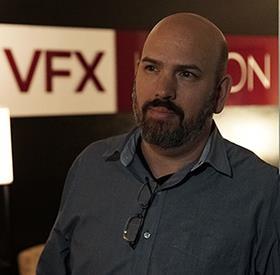Top tips for surviving in visual effects

James Hattin, the founder of global VFX studio VFX Legion, which has its HQ in Burbank, California and works remotely with a ‘worldwide web’ of senior artists, has written Broadcast the following ‘handy tips’ for how to survive in VFX.
Make friends
VFX is a relationship-based industry. It’s all about who you know, and as a company, you have to shake those hands continuously. The ideal situation is hitting a balance between regular, reliable work from existing friends and contacts, and building new relationships. Whatever you do: don’t let those relationships falter. Be as open and available to both clients and leads as possible.
Diversify
Prove yourself in as many disciplines as possible. We were recently put in touch with someone who heads many automotive projects, which is work we don’t generally pitch for as a speciality. However, we can do great stuff in that field, so we went for it. Don’t turn down work just because you might not be 100% comfortable with it. It’s wonderful to have a speciality, but demonstrating an ability to achieve on multiple fronts is even more desirable.
Find a niche
Diversify? Find a niche? You’re probably imploring us to pick a side and stick to it, but the truth is it’s a balance. You need a USP. At Legion, that’s offering a cost-effective solution with a 24-hour turnaround, thanks to a remote model that supports artists in almost every time zone. That’s attractive for a lot of our partners, since they know their shots will be worked on and delivered overnight. Your USP might be photoreal cars or insanely good motion graphics – whatever it is, sell yourself on it (but don’t make it the only thing you do!)
Stay on trend
There is no “could’ve” or “should’ve” when it comes to 4K. Today’s industry demands it, so you need to be able to do it. That should be true of any emerging technology. We’re seeing demand for increasingly more HDR work, for instance. That’s going to change the game once again as it becomes the new standard. You need to have a foresight to see this stuff coming and prepare, otherwise you’ll be left behind.
Be assertive
It’s a well-worn cliché, but that’s because it’s true: running a business is a lot like being a parent. Making the baby is easy, but those first 18 years are tough! What we’ve learned is that all those aspersions that it was easy to cast from the comforting shallows as an artist actually look very different when you’re there in the belly of the beast. You realise there were valid reasons for all those things you hated. The key to success is in communicating that. Don’t let your artists criticise from the comfort of the water cooler. Talk to them: help them understand you share their ideals, while demonstrating how unrealistic they can be.
Care
It’s shocking how often we hear clients say their previous VFX studio just “didn’t care” because a project wasn’t “big” enough. It’s this indifference that led them into our open arms! The fact is, many studios will not invest as much time or energy into projects they deem ‘unworthy’ of their talents…which is insane. Every project should be a triple-A blockbuster in your mind.
Find projects you can truly own
Our goal is to seek out projects we can take serious ownership of. Projects that pull VFX from different vendors can suffer from a lack of cohesion: one shot can look spectacular and the next can, quite frankly, look like garbage. From a business perspective, it makes things problematic when you’re pitching for more work if you’ve told them you’ve worked on a specific show and it’s confused with awful work you had nothing to do with. Find projects you can make your own, whenever possible.
Is remote working the answer?
We get asked a lot about our remote working model. But as far as we’re concerned, such a model isn’t necessarily “better or worse” – it’s just different. We run Legion as a facility, regardless of whether or not our artists are in the next room or 12,000 miles away. The project management, workflow and methodology aren’t affected by proximity. What makes the business successful is the same as it would be for any other brick-and-mortar facility: organization, passion, and a whole lot of talent.
PICTURED: El Chapo, with VFX by VFX Legion.

James Hattin founded VFX Legion and has worked on blockbusters films including Spiderman, Pirates of the Caribbean, 300 and TV’s How to Get Away with Murder and Scandal.





























No comments yet